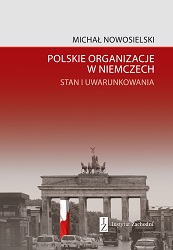
We kindly inform you that, as long as the subject affiliation of our 300.000+ articles is in progress, you might get unsufficient or no results on your third level or second level search. In this case, please broaden your search criteria.

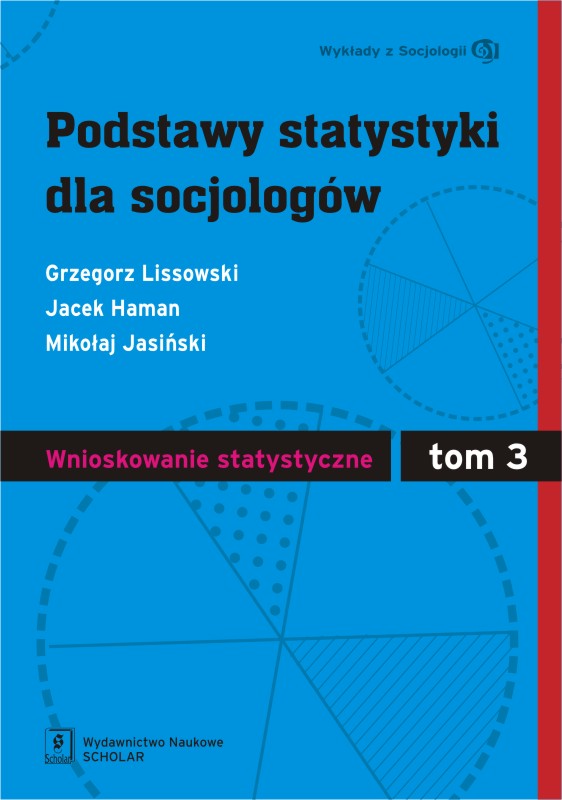
Większość badań statystycznych prowadzi się na próbach dobranych z populacji, ale ich wyniki uogólnia się na całą populację. Obliczenie prawdopodobieństwa popełnienia określonego błędu lub błędu o określonej wielkości przy takim uogólnieniu możliwe jest wtedy, gdy próba została dobrana w sposób losowy. Służy do tego rachunek prawdopodobieństwa, którego elementarne, niezbędne podstawy przypomniano tu i uzupełniono. Przedstawiono najczęściej stosowane przez socjologów metody wnioskowania statystycznego: metody estymacji parametrów statystycznych i weryfikacji hipotez statystycznych. Oprócz najprostszego sposobu losowania próby (dobór prosty losowy), wystarczającego dla wyjaśnienia podstawowych pojęć i metod wnioskowania, omówiono także inne schematy doboru próby, które umożliwiają wykorzystanie posiadanej wiedzy o populacji dla uzyskania dokładniejszych i bardziej wiarogodnych wyników bez zwiększania liczebności próby oraz ułatwiają realizację badań reprezentacyjnych.
More...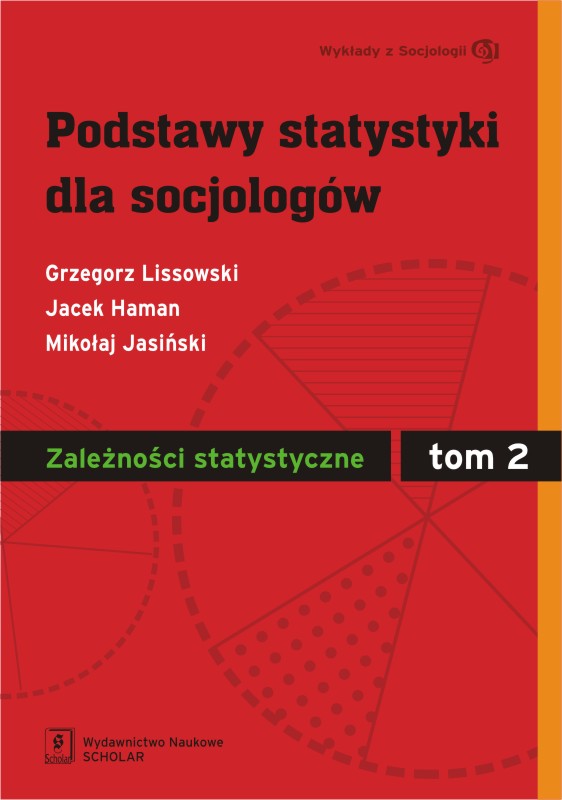
Przedstawiana w drugim tomie analiza zależności statystycznych między dwiema lub większą liczbą zmiennych to najczęściej stosowany przez socjologów rodzaj analiz statystycznych. Główną przyczyną trudności pojawiających się podczas wyboru metody opisu i pomiaru siły zależności statystycznych jest nieznajomość teorii, a przede wszystkim błędne przekonanie, że istnieje tylko jeden typ zależności statystycznej, mierzonej na różne sposoby w odmiennych sytuacjach. W podręczniku zaprezentowano wiele typów zależności statystycznej: zależność stochastyczną, zależność korelacyjną, skorelowanie liniowe, korelację rangową itd. Podstawą ich wyróżnienia jest nie tylko rodzaj posiadanych danych, charakteryzowanych przez typ skal pomiarowych, lecz przede wszystkim sposób optymalnego opisu jednej zmiennej na podstawie informacji o drugiej zmiennej lub o większej ich liczbie. Dużo miejsca poświęcono klasycznym metodom wielozmiennowym: zależnościom warunkowym (w tym pozornym zależnościom i niezależnościom) i regresji wielokrotnej oraz związanym z nimi nowym problemom (zależności cząstkowej, addytywności i interakcji między zmiennymi). Tom ten kończy przegląd celów i metod wielowymiarowej analizy statystycznej.
More...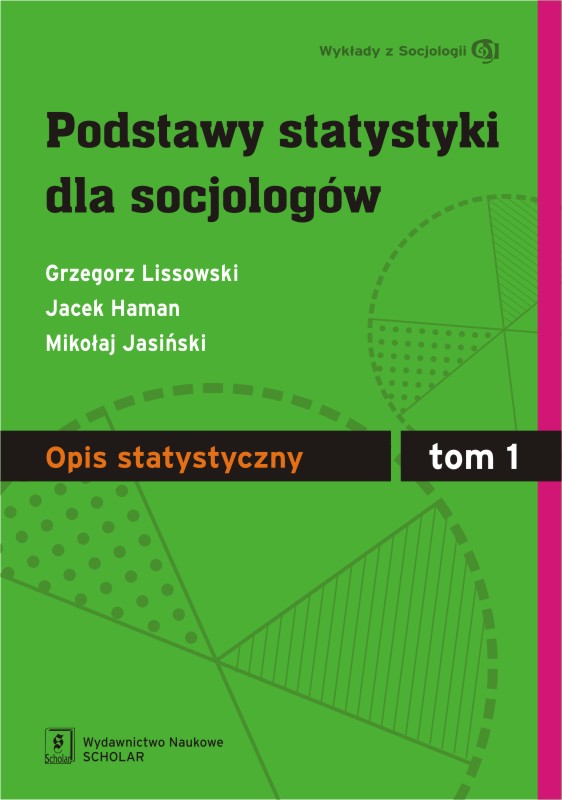
Podręcznik przedstawia elementarne metody opisu i wnioskowania statystycznego i wyjaśnia ich podstawy teoretyczne. Jest pomocny w podejmowaniu świadomych decyzji badawczych i interpretowaniu wyników badań. Autorzy polecają go osobom zajmującym się socjologią, naukami politycznymi i pedagogiką – studentom, wykładowcom oraz praktykom; będzie on przydatny również dla psychologów i ekonomistów, a także dla wszystkich zainteresowanych teorią i praktyką stosowania metod statystycznych w naukach społecznych. Książka uwzględnia zagadnienia pomijane w standardowych podręcznikach, na przykład ujęcie opisu statystycznego jako problemu podejmowania decyzji. Wyraźnie rozdzielono w niej metody opisu i wnioskowania statystycznego, co ułatwia ich zrozumienie. Obecne wydanie składa się z trzech tomów: Opis statystyczny (t. 1), Zależności statystyczne (t. 2) i Wnioskowanie statystyczne (t. 3).Tom pierwszy obejmuje opis struktury badania statystycznego, sposoby prezentacji jego wyników w postaci rozkładów statystycznych, parametry różnych własności rozkładu zmiennej statystycznej: poziomu wartości, rozproszenia, asymetrii, koncentracji itp. Parametry statystyczne opisujące różne własności rozkładu są ze sobą powiązane za pomocą sposobu oceny błędu opisu.
More...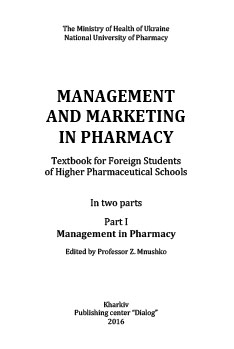
With the formation of market relations there are major changes and diversification of objectives, principles and methods for managing pharmaceutical organizations. Enterprises that are reforming their management systems provide a strong competitive position and opportunities for further effective development. Managers have incentives to successful and efficient use of all resources - material, financial, human, information, etc., to reorganize the management of enterprises and associations. Application of modern instruments for coordination and regulation contributes to the organization work as a single system and focus on achieving strategic goals. In this regard, there are prerequisites for wide practical application of the management theory. Becomes important to use modern approaches to planning of the company or association, create effective modern organizational structures, improve technological processes, increase productivity. To increase the efficiency of production, trade and management one needs the active involvement of the staff in goal setting, discussion and decision making, in shaping a positive image of the organization. In other words, the importance of human resources, personnel management, the role of human factor in the development and efficiency of an enterprise or institution in-crease. Hence, the need for a flexible system of incentives for the staff. At the same time the modern efficient organization of control, identification and evaluation of a business entity remains significant.
More...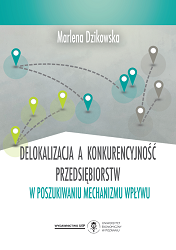
W książce skupiono się na zagadnieniach koncepcyjnych odnoszących się do kwestii konkurencyjności przedsiębiorstwa i delokalizacji modułów łańcucha wartości. W związku z tym książka ma charakter interdyscyplinarny. Do istotnych subdyscyplin naukowych zajmujących się omawianym obszarem badawczym należy zaliczyć m.in. teorie przedsiębiorstwa, ekonomię branży, zarządzanie strategiczne, internacjonalizację przedsiębiorstw, biznes międzynarodowy, międzynarodowe stosunki gospodarcze oraz zarządzanie łańcuchem dostaw. W szczególności w książce kompleksowo przedstawiono autorski schemat analityczny wpływu delokalizacji modułów łańcucha wartości na konkurencyjność relokującego przedsiębiorstwa.
More...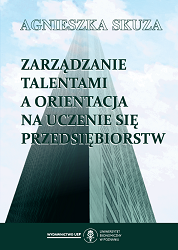
Zasadniczym celem pracy jest ustalenie wpływu zarządzania talentami na orientację na uczenie się przedsiębiorstw. Jego realizacja wymagała opracowania spójnych koncepcji obu zagadnień oraz ich empirycznej weryfikacji. Autorka ocenia programy i procesy zarządzania talentami w Polsce, zajmuje się problemem modelowania organizacji uczącej się oraz przedstawia wyniki swoich badań.
More...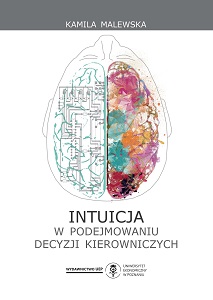
Monografia "Intuicja w podejmowaniu decyzji kierowniczych" stanowi interesującą poznawczo i oryginalną pracę dotyczącą problematyki intuicji w procesach podejmowania decyzji. Przemawia za tym ważkość podjętego problemu i jego wnikliwe ujęcie, oparte na solidnych podstawach teoretycznych, wzmocnione rzetelnymi badaniami empirycznymi. Na podstawie szeroko zakrojonej analizy literatury przedmiotu dokonano udanej konceptualizacji i operacjonalizacji intuicji w praktyce podejmowania decyzji poprzez zaprojektowanie autorskiego narzędzia umożliwiającego pomiar poziomu potencjału intuicyjnego oraz stopnia jego wykorzystania w procesach decyzyjnych. Narzędzie to może być z powodzeniem wykorzystane przez praktyków zarządzania w celu określenia braków kompetencyjnych w tym obszarze. W wyniku realizacji części empirycznej pracy zidentyfikowano i stworzono także typologię determinant wykorzystania intuicji w procesach decyzyjnych oraz dokonano hierarchizacji sytuacji i warunków decyzyjnych wymagających odwołania się do intuicji. Otrzymane w tym obszarze rezultaty mają także wymiar aplikacyjny poprzez uświadomienie decydentom szczególnej roli intuicji w określonych sytuacjach decyzyjnych. Za kolejny wkład w rozwój nauk o zarządzaniu uznać można nakreślenie i empiryczną weryfikację profilu intuicyjnego decydenta. Jako bardzo wartościowy recenzenci wydawniczy monografii ocenili opracowany przez autorkę konceptualny model procesu podejmowania decyzji integrujący intuicję z racjonalną analizą. W trakcie realizacji postępowania badawczego model ten został poddany rekonstrukcji, w wyniku której został sformułowany model empiryczny. W tym modelu sprecyzowano poszczególne etapy oraz podjęto próbę odtworzenia przebiegu procesu decyzyjnego zakładającego współistnienie podejścia intuicyjnego i racjonalnego w praktyce podejmowania decyzji. Zidentyfikowano etapy wspólne dla obydwu podejść oraz te, które je różnicują. Opinie menedżerów przyczyniły się do wyróżnienia faz procesu, w których szczególną rolę odgrywa intuicja, oraz tych o charakterze analitycznym. Efektem dialogu z decydentami było także zidentyfikowanie występujących między poszczególnymi fazami sprzężeń zwrotnych. Dodatkowo model ten został uzupełniony o determinanty, które decydują o przewadze podejścia intuicyjnego lub racjonalnego w realizowanym procesie decyzyjnym. Uzyskane w tym obszarze rezultaty poznawcze z pewnością mogą stanowić punkt wyjścia dla przyszłych zamierzeń badawczych podejmowanych przez przedstawicieli nauki. Przeprowadzone studia literaturowe oraz badania empiryczne na reprezentatywnej grupie przedsiębiorstw pozwalają na sformułowanie implikacji dla praktyki gospodarczej. Podstawową kwestią w tym aspekcie jest uświadomienie decydentom roli intuicji we współczesnych procesach decyzyjnych oraz możliwości jej doskonalenia, a także sformułowanie rekomendacji dla kadry zarządzającej dotyczących perspektyw wykorzystania intuicji w przyszłości. Podsumowując, można stwierdzić, że uzyskane rezultaty poznawcze wnoszą nowe treści do nauk o zarządzaniu, a opracowana monografia jest pierwszą w Polsce pracą, która gruntownie przedstawia problematykę intuicji w procesach podejmowania decyzji kierowniczych w wymiarze zarówno teoretycznym, jak i empirycznym.
More...
The publication is a comprehensive study on job satisfaction and job performance. It presents the leading perspectives, theories, and models of the described phenomena, so far analyzed mainly in foreign literature. The presented research attempts to find the relationship between job satisfaction and job performance, and the obtained results shed new light on their relation-ship, which turns out to be more complex than previously assumed. This book is for management practitioners, including managers, team leaders, human resource management specialists, and others interested in organizational studies. It is also a valuable source of knowledge for psychology and management students.
More...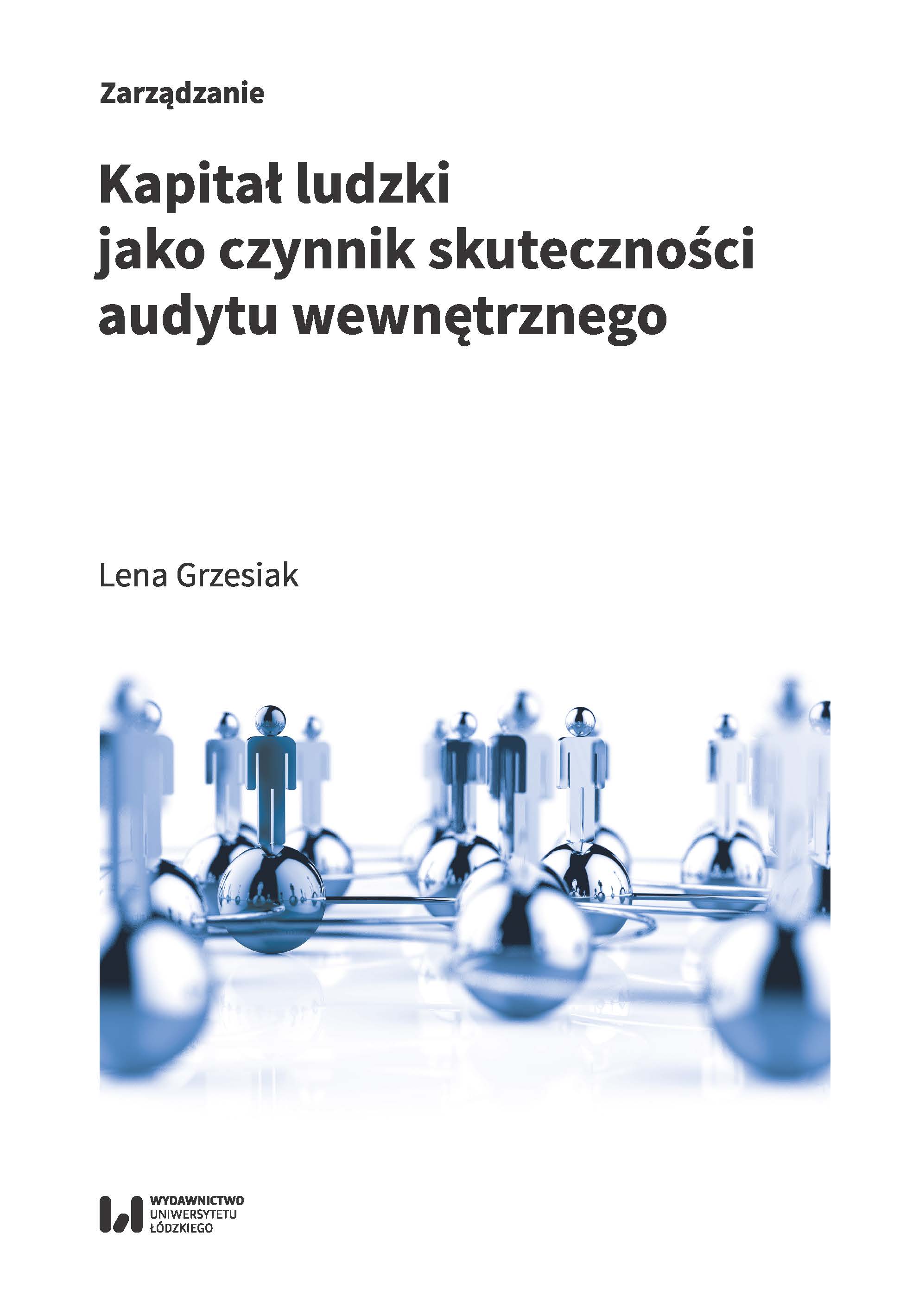
Internal audit is an interdisciplinary concept, well-established in management theory and practice theory. Internal auditors are required to be independent and objective, but the nature of internal audit activities necessitates relations with other groups of employees who also have a role in internal audit – auditees and managers. The three groups differ in the way they understand their organisation, internal audit, and its effectiveness. The main purpose of this monograph is to identify factors in the effectiveness of internal audit related to the human capital of the three main groups of its participants: internal auditors, auditees, and managers. The empirical qualitative study was carried out by the author using various data collection techniques, the most important of which was interviews with 65 internal auditors, auditees, and managers representing organisations in the public and private sectors. The study has shown that for internal audit to be effective, support from the management (tangible and intangible), the understanding of internal audit in the organisation, and relationships between the groups engaged in internal audit are important. Using her findings, the author formulates recommendations for improving internal audit effectiveness. They can also provide a basis for making changes to the existing occupational and organisational practices. The monograph can be summed up by the opinion of one of the surveyed internal auditors: “the effectiveness of internal audit has to do with people […]. This fact is so obvious that it is frequently forgotten by most stakeholders”.
More...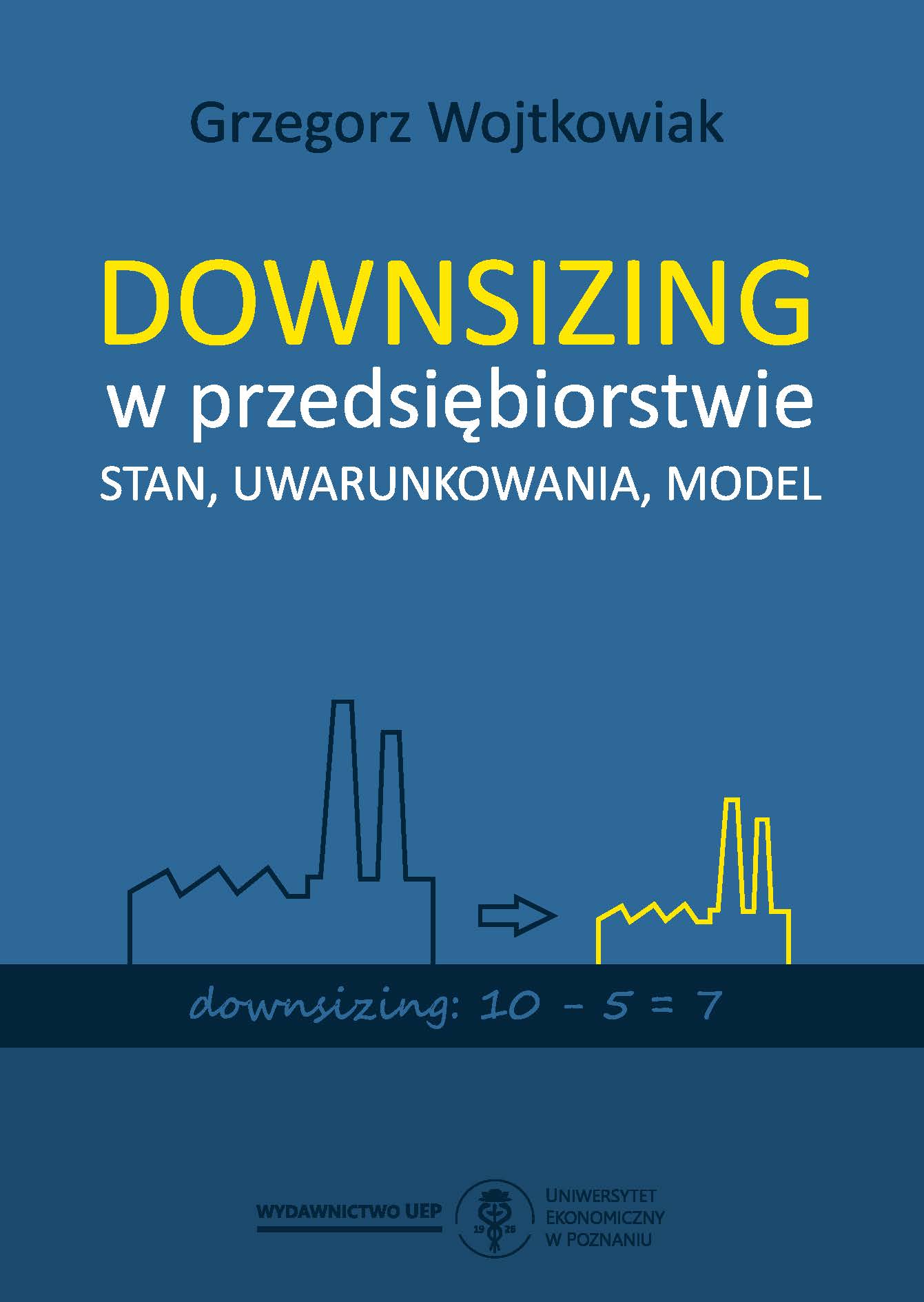
Książka podejmuje zagadnienie współczesnego downsizingu. Opiera się na założeniu, że zmiany w gospodarce wpłynęły na ewolucję downsizingu, a to wygenerowało potrzebę redefinicji pojęcia i roli tego procesu oraz określenia nowego modelu wykorzystania go w przedsiębiorstwie. Kompleksowość zagadnienia i wykazana szerokość jego znaczenia wymusiły postawienie pytania o przebieg procesu podjęcia decyzji o downsizingu i jej realizacji, w tym o definicję jego skali, efektów i uwarunkowań stosowania. Głównym efektem pracy jest sformułowanie koncepcyjnego modelu przedstawiającego podejmowanie decyzji o downsizingu i jej realizacji. W książce dokonano redefinicji i systematyki współczesnego procesu downsizingu oraz umiejscowiono go wśród innych metod i narzędzi zarządzania. W sferze poznawczej określono skalę występowania downsizingu w Polsce i efekty jego wdrażania, rozpoznając również czynniki i uwarunkowania wpływające na jego realizację. Ważnym efektem aplikacyjnym była identyfikacja i uporządkowanie narzędzi stosowanych w procesie realizacji downsizingu oraz barier i zagrożeń w ich stosowaniu, a także zdefiniowanie pojęcia potencjału downsizingowego. Istotnym wkładem autora w badania nad współczesnym downsizingiem jest wyciągnięcie wniosków zarówno z badań danych finansowych, jak i badań jakościowych, czego efektem jest rekomendacja polimetodycznego podejścia do procesu poznania downsizingu, a także wskazanie kierunków przyszłych badań.
More...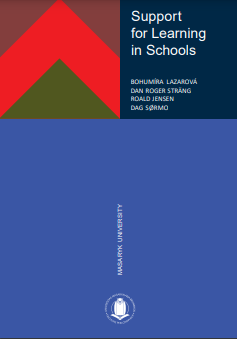
The book is a collection of studies aimed at a wide scope of support for learning in Norwegian and Czech schools. The authors present data of selected surveys on this matter as carried out in recent years. The results are a synthesis of research knowledge as well as a resource for comparison of Czech and Norwegian conditions and support mechanisms for the development of learning and improvement of quality in schools.
More...
Support for learning in schools is a subject based on efforts to develop schools towards openness and quality. It is a topic that reacts to the changing appearance of Europe and is becoming a focus of attention in various European and national documents of educational policy and strategy. Evoking a number of co-subjects such as organizational learning, peer support, school counselling, mentoring and reflection of practice, the processes of learning in schools apply to both children and adults. The efforts of education politicians, researchers and, obviously, people working in schools are interwoven in these themes. An interest in this subject has brought Norwegian and Czech authors together in order to create this publication and offer it to readers involved in education and schooling. Supported financially by the Norway Grants, this book is a collection of analytical studies in a variety of forms of support for the processes of learning in Norwegian and Czech schools. The aim of the publication is to present an image of how these processes are supported at the level of education policy as well as in everyday practice. Its purpose is not to present fully comparable data, however; instead, the content of particular chapters presents what is characteristic of Norwegian and Czech education in the opinions of their authors. Their articles are based on both specialist national references and results of their own research. The initiatives for the support of learning processes in schools and the resulting experience are discussed in the framework of the European trends outlined in the opening chapter. The publication starts with a brief description of the term ‘school development’, paying particular attention to the relation between theories of learning and education and practice. An important role in this connection is played by reflection on learning and teaching, i.e. reflection on practice, which is one of the most important concepts addressed throughout this publication. The book is divided into four parts. Part One, entitled Norwegian and Czech schools: Policy and practice, is devoted to selected issues of Norwegian and Czech education (Chapters 2 and 3) and the European trends mentioned above (Chapter 1). The Norwegian authors emphasize several historic milestones in the development of Norwegian education, comment on the internationalization of Norwegian schools and highlight some current topics: debates on the professionalization of teaching and its image in the media, stress on care for pupils with special education needs and an increasing demand for counselling and guidance of teachers. These topics, typical of the current needs of Norwegian education, resemble to a certain extent the situation in Czech education. As for the current issues of Czech education, the book pays attention to pupils’ results, inclusive education and the career order of teachers. The opening part is concluded with a list of selected systemic support measures and initiatives implemented by various subjects supporting school development and the quality of learning processes in schools. The Norwegian authors refer to the National system of quality assessment which comprises control mechanisms and methodological support, and they emphasize a deficiency in the abilities of schools to analyse data. Another topic in this part of the book is support in health, counselling and social matters, as provided to families and schools by various subjects (Chapter 4). The Czech counterpart mentions initiatives focusing more narrowly on the development of the quality of teaching. Major legislation and strategic documents are presented together with selected support programmes and projects managed at the levels of the state (Ministry of Education), non-profit organizations and other subjects active on the nationwide and local scales (Chapter 5). Part Two of the book, Support of teachers in theories, focuses in more detail on professional development of teachers and schools as a necessary condition for ‘better learning’. This part presents selected theories on which many efforts to support teachers and whole schools are based. The theory of organizational learning, emphasizing the reflectionbased concept of justified practice, is presented first (Chapter 6). Chapter 7 is devoted to mentoring and other kinds of counselling in schools as important processes that can support learning (and reflection) on individual and organizational levels. In this respect, mentors and school consultants are regarded as agents of change. The aim of the last chapter in this part (Chapter 8) is to present selected theories about reflective processes, reflective practice and reflection with reflecting teams devised by the Norwegian psychiatrist Tom Andersen. This chapter highlights the transfer of a systemic approach used in psychotherapeutic practice and social work to the context of schools and accentuates its benefits for teachers’ reflective practice. Part Three of the publication, Learning teachers as seen through research, presents selected results of recent research surveys that the authors carried out with the focus on the processes of learning and peer support in schools. The data produced by these studies reflect the professional specialization of authors, illustrate specific forms their efforts take and evidence impact on school practice. The Norwegian authors (Chapter 9) present the results of a research and development project called Learning and Assessment, which has enabled many schools to test measures for the development of learning focus and awareness. The Czech author (Chapter 10) presents data of evaluation surveys carried out in schools that can draw on long-term support from mentors and consultants within the project Helping Schools Succeed. She points out the potential of mentoring and counselling in the course of deepening, dissemination and anchoring (after Verbiest) of learning processes in particular learning communities. In the last chapter in this part (Chapter 11), one of the Norwegian contributors summarizes the results of three projects (KARIB, Låby, Berg) with development and research objectives, aimed at the development of reflection practice with the use of reflecting teams in schools. The last part, Concluding remarks, contains one chapter as a recapitulation of the whole book. It stresses the importance of a sustainable support system for teachers and schools that would include reflection on practice. This publication offers inspiration for how a learning support system can be built, and on which foundations.
More...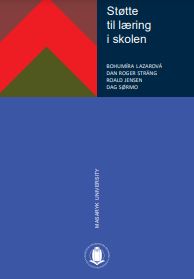
The book is a collection of studies aimed at a wide scope of support for learning in Norwegian and Czech schools. The authors present data of selected surveys on this matter as carried out in recent years. The results are a synthesis of research knowledge as well as a resource for comparison of Czech and Norwegian conditions and support mechanisms for the development of learning and improvement of quality in schools.
More...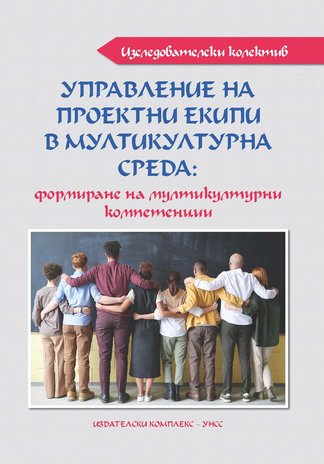
In conditions of enhancing globalization and multicultural business environment the successful management of project teams seems to be a significant factor for increasing the effectiveness of the projects executed at local, national, and international level. This thesis facilitates the formulation of the main goal of the study, namely, to identify and justify the factors, characteristics, and perspectives of the management pf project teams in multicultural environment in Bulgarian organizations. On this basis, a competence model for effective operation in such an environment of project managers and project team members is developed. The object of this study is the management of project teams operating in a multicultural environment. The subject of the study are the major factors, characteristics, and perspectives of the management of project teams performed in specific multicultural conditions. On the basis of executed research activities, results have been achieved in the following main areas: (1) Cultural aspects impact, including the national cultural environment, on project management and project teams management has been explored. Different models, study approaches, and measures have been assessed in respect of the cultural influences on project management of the formation of project culture. (2) Research approaches and methods implemented in the international scientific literature for empirical studies of various aspects of project teams management operating in multicultural environment are systemized. (3) Empirical research instruments are developed and a questionnaire survey is conducted, focused on the effectiveness of project teams operating in specific conditions of multicultural environment. Utilizing the empirical data from the survey, practices of formation and operation of project teams in such conditions have been explored. On the basis of the survey results practical directions are outlined towards the enhancement of the management of project teams in a multicultural environment.
More...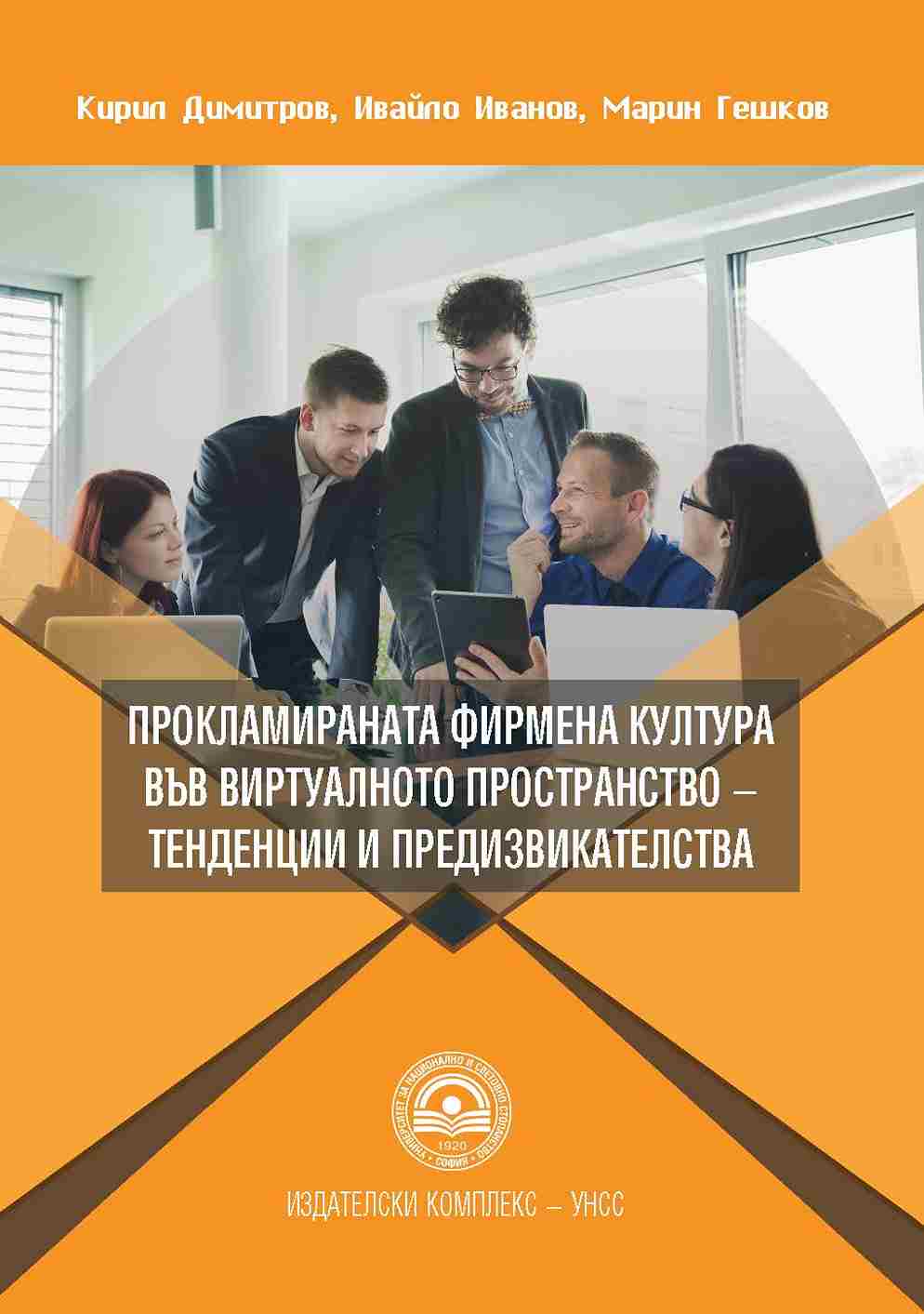
The turbulent development of the economic and social phenomena, objects and relationships that took place during the last decade of the twentieth and first two decades of the twenty-first century outlined several problem areas in the management of the prosperous companies all over the world. The array of the most famous problem areas includes the use of quantitative methods, management by objectives, total quality management, the idea of "the perfect company", the implementation of strategic management, anti-crisis management, and corporate culture, in which basic assumptions and shared values of personnel members are the foundation of corporate existence and the key to establishing and maintaining a healthy balance of interests among the various stakeholders. Over the same period, these overlapping areas became a kind of "growth catalysts" for successful business organizations, and they were passing through the world as waves of managerial fashion, the movements of which varied from west to east and from north to south, although the contributions of the East and the South (Japan, "the Asian Tigers" and "the World Factory" - China) cannot be underestimated either. For many reasons and for great regret these waves reached to Bulgaria with a long delay and weakened power. The research question about design and disclosure of professed firm culture in the virtual realm within the member companies of eight local employers' organizations is posed in this monography, especially given the widespread penetration of information technologies in the business world and the presence of foreign "players" on Bulgarian market in various forms due to globalization. In this way, the current trends in description and presentation of the specific official firm culture are delineated by the founders of the respective business (and/or later changed by the organizational leaders of the existing company) in the context of cultural diversity in the implementation of the strategic management at organizational level, the functioning of the relationship "culture - strategy", the peculiarities of organizational realizations at different cultural levels and other factors. At the same time, the main approaches and challenges to the creation and disclosure of the most widely used elements of professed firm culture are presented, and reasonable advice is given to managers in business organizations. The monograph can be useful not only for university students, but also for managers and practitioners regardless of the economic sector, where they contribute or the life cycle of the respective companies in a case that cultural interventions are aimed at solving (resolving, absolving) business-related organizational problems.
More...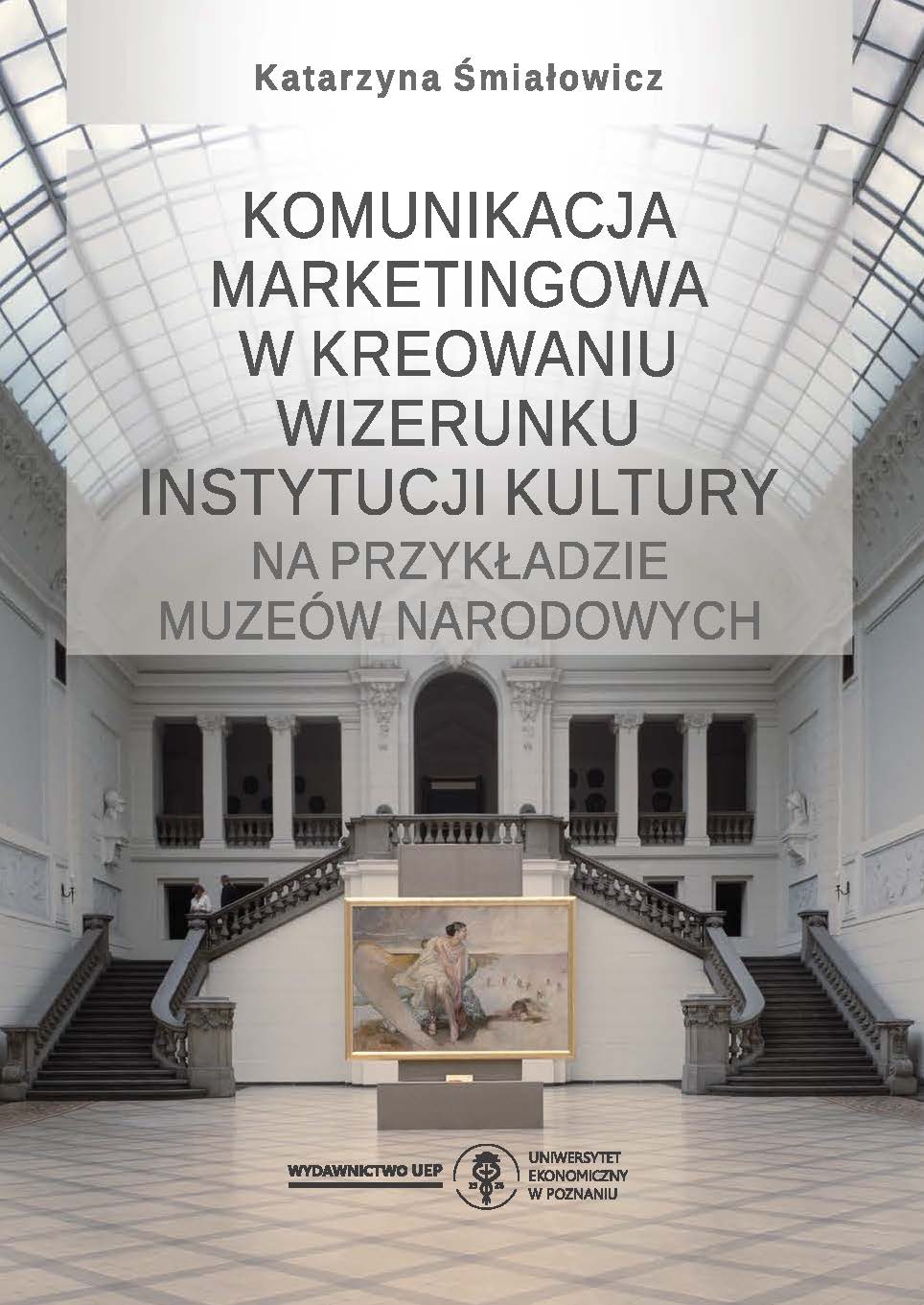
Monografia dotyczy ważnej problematyki znaczenia komunikacji marketingowej w kształtowaniu wizerunku instytucji kultury na przykładzie muzeów narodowych. Infrastruktura muzeów w Polsce systematycznie się rozwija, jednocześnie zmieniają się rola oraz funkcje muzeów. Zmiany te dotyczą m.in. zarządzania, marketingu, a także objawiają się w nowym podejściu do tworzenia wartości kulturowej. Współczesne instytucje kultury powinny być nie tylko otwarte i dostępne, powinny również komunikować się z otoczeniem społecznym, a szczególnym ich zadaniem jest zainteresowanie młodych dorosłych odbiorców (generacji Z). Muzea i galerie narodowe o profilu artystycznym, udostępniające najważniejsze narodowe kolekcje, mierzą się z podobnymi problemami w większości krajów Europy. Są to wielooddziałowe instytucje, najczęściej niedofinansowane, które stają w obliczu niespotykanej dotychczas konkurencji związanej z dostępnością wielu innych form spędzania wolnego czasu. Na podstawie studiów literaturowych oraz badań empirycznych autorka podjęła się identyfikacji i oceny znaczenia działań z zakresu komunikacji marketingowej muzeów narodowych w kształtowaniu wizerunku tych instytucji kultury wśród młodych dorosłych odbiorców. Projekt dofinansowany ze środków budżetu państwa, przyznanych przez Ministra Edukacji i Nauki w ramach Programu "Doskonała nauka II. Moduł: Wsparcie monografii”.
More...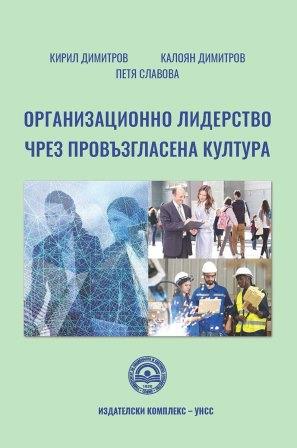
The challenges, confronting companies that operate in Bulgaria in the second and third decades of the twenty-first century require their managers to constantly make efforts to attract, retain, engage and energize the people contributing to the successful long-lasting existence of the respective businesses in their role as the only source of sustainable competitive advantage, not subject to timely copying by competitors, even under the conditions of disruptive innovations. That is why managers often have to go outside their comfort zone by experimenting in specific organizational contexts, deliberately pursuing enrichment in the systematization of implemented human resource management methods. For this reason, the special position of organizational leadership, the creation of a specific corporate (firm, company) culture and the nature of realizing effective interaction between them as a driver for the successful development of companies in the modern dynamic business environment is substantiated in this collective monograph. Based on an in-depth and critical literature analysis, the contributions of selected postmodern theories and management approaches, as well as targeted new characteristics of business organizations to achieving organizational leadership, are grounded. This allows the formulation of a useful and modern definition of the concept of "organizational leadership". From this starting point, the role of corporate culture for the creation, maintenance and development of organizational leadership is started to be substantiated through the mandatory clarification of the important for scientific research and management practice relationships such as "innovation – culture", "organizational leadership – corporate culture" and "organizational leadership – formal corporate culture", the study of which would assist managers in dealing with the problems that confront the business, due to undertaking social innovation, unlearning old practices, adopting and embedding in consciousness new ways of thinking and acting, especially through appropriate formulation and public disclosure to stakeholders of their strategic business intentions. In connection with the latter, on the basis of the results of the theoretical and empirical research, the essential characteristics of the elements of the proclaimed organizational culture, comprising its structure, are derived and an updated definition of the concept of "proclaimed firm culture" is proposed. Specific recommendations are provided to senior managers to gain leadership positions through their companies in terms of uncovering the proclaimed organizational culture with a view to achieving sustainable competitive advantage. This monograph represents a significant step in the development of management theory related to organizational leadership and its cultural dimensions
More...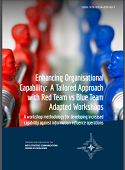
The purpose of the report is to present a method for exploring an actor’s possibilities for countermeasures and capabilities against information influence operations (IIO). Using specific scenario conditions, the method assists in creating a discussion on what capabilities are needed and how organisations can develop these capabilities based on available resources. The method involves conducting workshops using a red team versus blue team exercise which has been adapted to generate a gap analysis for countermeasures in countering IIO. The report provides guidance on preparing for a workshop aimed at identifying vulnerabilities in an organisation’s information environment and developing effective strategies to mitigate the consequences of IIO. The workshops create a common problem understanding from a scenario and challenges chosen beforehand. The end result is an analysis that includes existing capabilities in the organisation, a reflection on how to develop capability activities and functions further, and prioritising between these. The report concludes that the workshop method is a useful tool for risk assessment and preparedness planning, and can be used for decision-making and operational development. While countering IIO is often a national-level responsibility, we argue that all parts of society can be affected by IIO and should develop capabilities to counter disinformation. Therefore, the selected workshop method can be adapted to work on a local, regional, or national level.
More...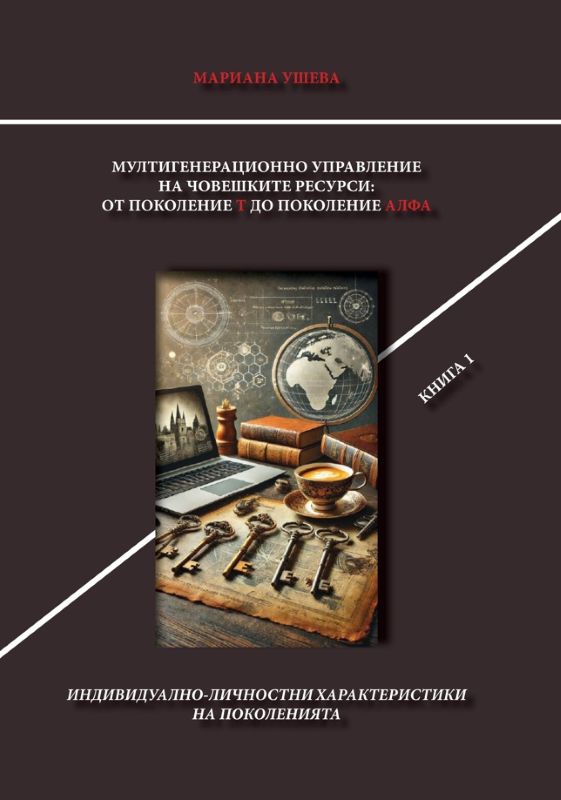
This book offers an in-depth analysis of generational differences and their impact on the work environment. The author examines the individual-psychological characteristics of each generation, including their economic, social, cultural and ideological peculiarities. Special emphasis is placed on the unique factors shaping the identity and behavior of generations in the Bulgarian context. Book 1 of the monograph traces the main trends and transformations that determine the differences between generations. It also analyzes the specifics of organizational processes in human resource management in a multigenerational environment. The study emphasizes the importance of integrating the specific needs of different generations into organizational processes, which leads to a more effective, motivated and satisfied workforce.
More...